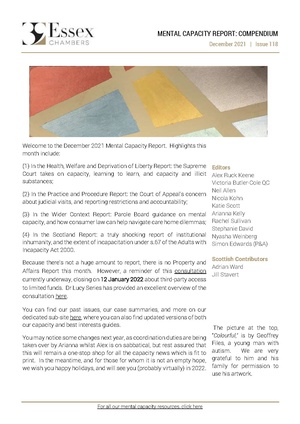| Display title | A Local Authority v JB [2021] UKSC 52 |
| Default sort key | A Local Authority v JB (2021) UKSC 52 |
| Page length (in bytes) | 2,257 |
| Page ID | 14000 |
| Page content language | en - English |
| Page content model | wikitext |
| Indexing by robots | Allowed |
| Number of redirects to this page | 0 |
| Counted as a content page | Yes |
| Page image |  |
| Edit | Allow only users with "editing" permission (infinite) |
| Move | Allow only users with "editing" permission (infinite) |
| Page creator | Jonathan (talk | contribs) |
| Date of page creation | 22:49, 25 November 2021 |
| Latest editor | Jonathan (talk | contribs) |
| Date of latest edit | 21:29, 6 June 2023 |
| Total number of edits | 4 |
| Total number of distinct authors | 1 |
| Recent number of edits (within past 90 days) | 0 |
| Recent number of distinct authors | 0 |
Description | Content |
Article description: (description)
This attribute controls the content of the description and og:description elements. | The joint expert described JB's number one priority as "to get" a woman as a sexual partner, with the sole goal being physical and sexual contact with a woman and any woman, and that JB lacked understanding of concepts of consent by the other person and so posed a risk of sexual offending to women. The Supreme Court (dismissing the Official Solicitor's appeal) decided that in assessing JB's capacity "the matter" was his "engaging in" (rather than consenting to) sexual relations, and that information relevant to that decision includes the fact that the other person must have the ability to consent to the sexual activity and must in fact consent before and throughout the sexual activity. The Supreme Court reiterated that capacity assessments should first ask whether the person is "unable to make a decision for himself in relation to the matter" (which involves formulating "the matter" and consequently identifying "the information relevant to the decision" which includes information about the reasonably foreseeable consequences to the patient and others) and secondly ask whether that inability is "because of" an impairment of, or a disturbance in the functioning of, the mind or brain. In relation to sexual relations "the matter" will ordinarily be formulated in a non-specific way: in this case JB's wishes were non-specific, but in another case "the matter" might be person-specific (e.g. sex between a long-standing couple where one person had a relevant impairment, or between two mutually-attracted people both with relevant impairments). The question of JB's capacity was remitted to the original judge for reconsideration. |
